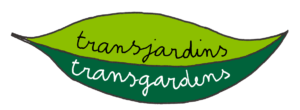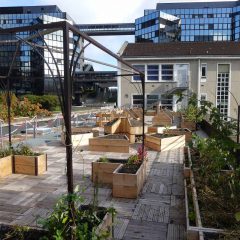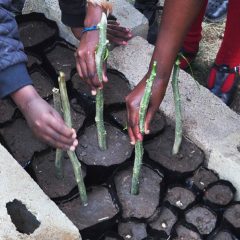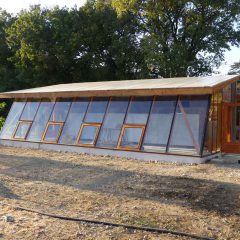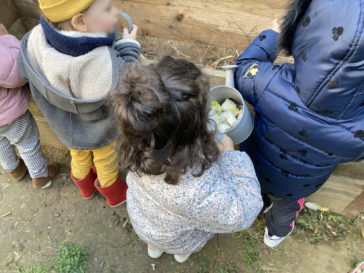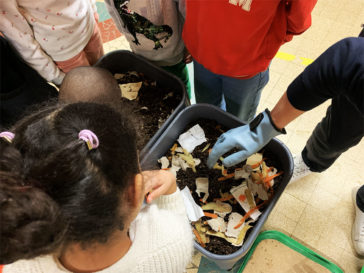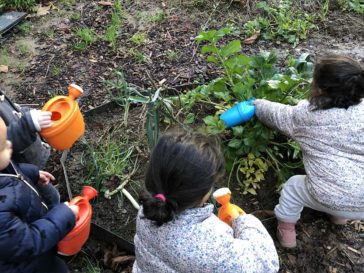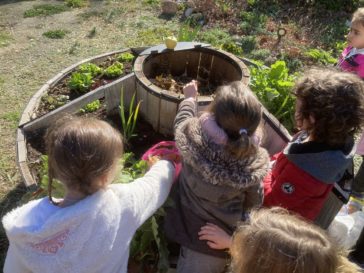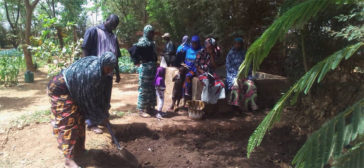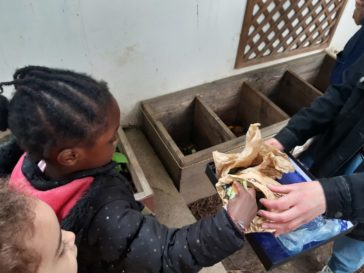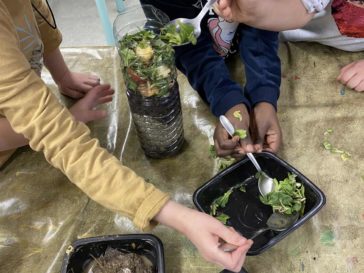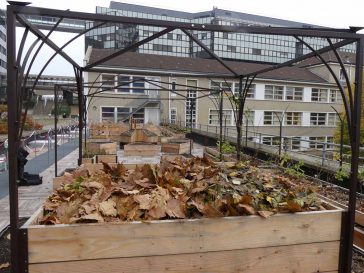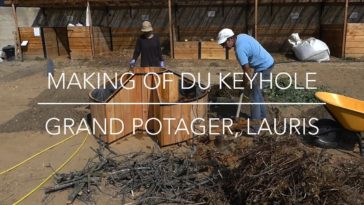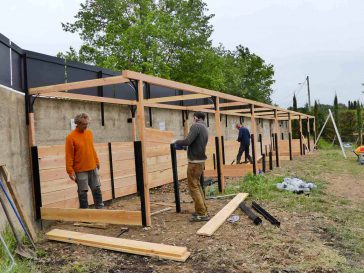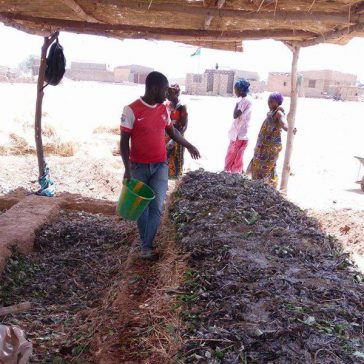Composting is the transformation of vegetable waste into a highly fertile soil that improves the structure and the fertility of the soil in which it is buried.
To make compost, we collect organic waste, from the kitchen and the garden, if they are small enough. We can also add some paper, cardboard, or paper towels if they do not have a trace of glue or ink.
In a few months, the different elements will decompose by natural aging, fermentation and also by digestion by the small bugs of the soil (earthworms, centipedes, clopores). These elements are compacted, reduced and become like fine soil, with a characteristic odor, which can be used to increase the fertility of the soil.
Related to the compost :
The Vermicompost
The Keyhole
Creating a Household Compost
Every Wednesday and Friday morning, children from the Villiot collective crèche spend an hour in the Traversine-Villiot garden. The children come with some vegetable waste from the crèche kitchen and put it in our compost, along with dead leaves collected … Read More
Designing Hope and the kindergarten of Bercy received from the City hall of Paris 2 vermicomposters with the compost worms. We installed a worm bin with the children of the Bercy primary schools and another worm bin with the children … Read More
Every Wednesday and Friday morning, the children of the Villiot collective crèche spend an hour in the Traversine-Villiot garden. The children come with some vegetable waste from the nursery kitchen and put it in our compost. Even though the plants … Read More
In order to fertilize the new planting beds set up each week in the Garden of Skills, the women of Fundzisa Live, accompanied by men from the community of Malanti, went to the logging area on the outskirts of Piggs … Read More
As every Wednesday morning, the team of Designing Hope animates a compost activity with the Bercy preschool children. Two by two, the children cut fruit and vegetable peelings into small pieces and place them in the compost bins. From time … Read More
The Lauris preschool children discovered the principle of the compost in the Grand Potager of the Domaine de Fontenille. The children took turns cutting fruit and vegetable peelings into small pieces and throwing them into the compost. This activity allows … Read More
For the first training session financed by The Ivory Foundation, the agroforestry technician working in the Yagma garden made compost with the women of the neighbourhood. The principle consists of digging a 3 by 1 meter bed to a depth … Read More
Peels, dead leaves, more peels and more dead leaves… One layer after another, our compost is built like a lasagna dish. The children were delighted to get their hands dirty to make it !
In front of the Grand Potager’s compost, the students from Lauris’ nursery school learned how to sort their waste. Plastic ? In the recycling bin ! Leftover chicken ? In the garbage can ! Vegetable peel ? In the compost … Read More
During school time activities, we decided to make a mini-composter with the children of Bercy School. For the production of our mini-compost, we needed different materials. We used as a container half of a plastic bottle. Then for the filling … Read More
Thanks to Biocoop Aligre, for this virtuous circle of waste, source of life in our garden of Traversine …
All those unmarketable vegetables that are starting to rot will delight the earthworms of the garden…
Leaves from the schoolyard + peelings and decomposed vegetables = Nitrogenous matter + carbonaceous matter … The secret of a good compost, 100% local
La Traversine develops a short circuit compost … The composter of La Traversine is preparing to digest the harvest of dead leaves from the past winter! We organized the composter in 2 bins, one stock the brown leaves collected from … Read More
At La Traversine, a demonstration compost bin was designed to show children the evolution of the decomposition process. We fill the tank by the left, mixing leftovers, peelings (nitrogenous matter) with the dead leaves recovered from the courtyard. Then, when … Read More
It’s autumn, not the greenest season for Traversine, but the opportunity to prepare biomass for spring! Every day, the staff of the 3 establishments (kindergarten, elementary and college), sweep the schoolyard to clear the dead leaves. Nothing was planned to … Read More
Making and filling a Keyhole. The Keyhole is a keyhole-shaped vegetable garden consisting of a central compost bin surrounded by raised beds. The Keyhole produces a large number of vegetables in a limited area, benefiting from the slow diffusion of … Read More
The first step in the launch of the Koudougou garden is the preparation of the compost beds. Two trenches 7m long and 1m wide, 20cm deep were dug. The first trench is used for the creation of the compost bed, … Read More
A composting area of 20 meters long has been set up on the Grand Potager, in order to upgrade green waste and create compartments for the storage of elements in different stages of maturation, as well as to allow them … Read More
The implementation of the activities linked to the project of creating an agro-forestry garden at Lycée Sainte Marie de Yagma in the outskirts of Ouagadougou, started with the support of The Ivory Foundation in March 2017. APAF Burkina, the local … Read More
After several months of throwing organic waste in the garden without organization, the children of the Half Way House decided to follow the advice of comics on permaculture and created a compost pile in the garden.
